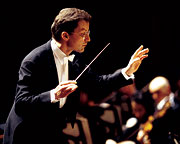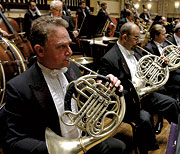
Conducting themselves accordingly: The Cleveland Orchestra ranks among the top-10 orchestras on the planet.
|
She’s not referring to a visit from Itzhak Perlman or Yo-Yo Ma when she calls Asheville Bravo! Concerts’ next show “a huge thing.”
Bravo! Executive Director Jan Milin is talking about the Cleveland Orchestra.
If you didn’t know better, you might snicker. But don’t be so quick to act like the fifth-chair flutist in a high school marching band: According to Gary Hanson, the orchestra’s own executive director, when the 104-musician ensemble tours in Europe, no one’s surprised that they’re from the city formerly dubbed “the mistake by the lake.”
“Audiences in Europe are familiar with the Cleveland Orchestra,” Hanson explains with the verbal equivalent of a cocked eyebrow.
It’s also no stranger to accolades: The orchestra was named “the finest in America” by The New York Times and “the Best Band in the Land” by Time magazine. It’s also ranked among the planet’s top 10 orchestras by the Japanese orchestra guide Sekai no Okesutora 123.
The rest of the world is in the know.
“The last time they came to Asheville was for Bravo! Concerts’ 50th Anniversary,” Milin notes. “As this is our 75th anniversary, it seemed fitting for them to come again.
“We have,” she says, “a very determined board of directors. They were able to raise enough money from extremely generous donors to underwrite [the orchestra’s] fee.” And that’s how it happened that the Cleveland Orchestra will be playing Asheville – their sixth visit since the 1930s – later this week.
Next stop, spring break

Cleveland Orchestra players have been known to be greeted at the airport like rock stars.
|
Founded in 1918, the Cleveland Orchestra (needless to say) has a long history. Now under its seventh musical director (Franz Welser-Möst) in a string of impressive conductors bearing impressively difficult names (Nikolai Sokoloff, Pierre Boulez, Christoph von Dohnányi), the company actually spends most of its time away from home.
“The orchestra has been traveling for 50 years,” says Bill Preucil, Cleveland Orchestra’s concertmaster (i.e., its first-chair violinist), taking a break from auditioning bassists to speak with Xpress. “We have tours that last up to three weeks sometimes. It’s a long time to be away from our homes and families, but it’s part of our jobs. It’s basically a three-week business trip.”
Though not many business trips culminate in clutches of fervent fans waiting at the airport, waving welcoming signs. “That doesn’t happen every day,” Preucil says, downplaying the rumors.
Still, the orchestra’s hometown fans have plenty of opportunities to miss them. Along with a residency in Vienna every other year (Welser-Möst also conducts orchestras in Berlin and Zurich) and an annual residency at Switzerland’s Lucerne Festival, the company just began a 10-year residency in Miami, at the Carnival Center for the Performing Arts.
The South Florida venture – three weeks of concerts and educational programs to be held each January – is more than a clever ploy to escape lake-effect snow.
“I don’t know that we’ll be getting a lot of beach time,” quips Hanson. “The reason for [the timing] is that there are the largest number of music lovers [in Miami] at this time of year.” Likely, many of those concertgoers are snowbirds fleeing winter in cities like Cleveland.
But it’s southbound travel that helped Asheville Bravo! Concerts snag the rust-belt phenom. The Cleveland Orchestra makes a stop in Asheville on the way back north from Florida. “They’re trying to work in concerts between Miami and Cleveland,” Milin explains.
Something old, something “Blue Danube”
But there’s more to building classical-music fans than logging frequent-flyer miles. In fact, when The New York Times lauded the Cleveland Orchestra as America’s “finest” two years ago, the paper also questioned the orchestra’s ability to last out the next decade.
Hanson’s prepared to meet that challenge. “Classical music, when it grabs somebody, generally [does so for] a set of obvious reasons: the emotional impact, the sonic splendor. But what is great about classical music is that when somebody comes to love it, they never stop loving it.”
Grooming new audiences helps make sure that happens. “Educational activities [such as the group’s work with the Cleveland Youth Orchestra] are extremely important.
“But,” he continues, “I don’t think you’d ever place that above playing symphonic music. The programming is probably the single most important aspect.”
The Asheville concert promises a piece by Osvaldo Golijov that Preucil describes as “fun, with a jazzy, rhythmically exciting movement and a very reflective movement”; a composition by Alberto Ginastera, which, as Preucil explains, offers a solo for every instrument in the orchestra; and a larger, familiar number by Mahler.
Balancing the safe with the strange can be tricky, especially since the Cleveland Orchestra is known for premiering works by national and international composers. “The way pieces are placed on a program is carefully thought through,” says Hanson. “You generally don’t put something like ‘Scheherazade’ on a program with ‘Missa Solemnis.'”
What Drew Carey never told us
Along with its other accolades, the Cleveland Orchestra has been called the most European of American orchestras.
“I think it’s a reference to the refinement that the Cleveland Orchestra always achieves,” Hanson offers. “That refinement is not just in technical skill, it’s in terms of the notes, in terms of the tonal color, balance, ways of articulation, flexibility in phrasing. There are a lot of things that are typical of some of the great European orchestras because of the traditions. Those orchestras have an extraordinary ability to pass traditions down through succeeding generations of musicians.”
Boasting nearly 100 years of existence, the Cleveland Orchestra has, similarly, been able to pass the baton. But, despite a 52-week season (only 20 other orchestras in the country maintain such a busy schedule) and international engagements, a major factor in the orchestra’s success is, well, Cleveland.
“The city of Cleveland has a remarkable respect and support for the arts,” Preucil stresses. “It’s not just the orchestra – the Cleveland Museum of Art, for example, is a fantastic place.”
However, “it’s certainly surprising that a city of Cleveland’s size can support one of the world’s great orchestras,” Hanson allows. “Cleveland Orchestra has a level of philanthropic support and concert attendance that, when expressed in per capita terms, is higher than any other city in the country.”
European leanings, autograph-demanding fans, French horn players risen to rock-star status: all positive cultural indicators in an American Idol age. Not that the orchestra is letting it go to their heads or anything. Lasting at least through the next decade means the classical-music neophyte is as important as any old-school longhair.
“At any given concert, there’s somebody who’s hearing Beethoven’s ‘Ninth Symphony’ for the first time, and there’s somebody who’s hearing it for the 100th time,” says Hanson. “But it has meaning for everybody.”
Sponsored by Asheville Bravo! Concerts in its 75th-anniversary season, the Cleveland Orchestra performs at Thomas Wolfe Auditorium at 7:30 p.m. on Sunday, Jan. 28. Tickets run $35-$85. 259-5544.
Beyond the orchestra pit
Being home to the nation’s best orchestra is a big deal, but that’s not Cleveland’s only claim to fame. For better or worse, here are some of the city’s other accomplishments:
• 39th-largest city in the United States
• Home to the Rock and Roll Hall of Fame and Museum, opened in 1995.
• Nicknamed “the mistake by the lake” by the press due to financial problems, various struggling sports teams and the infamous, pollution-induced 1969 fire that occurred on the Cuyahoga River.
• Nicknames include the “Forest City,” “Metropolis of the Western Reserve,” “the New American City,” “America’s North Coast” and “C-Town.”
• NBA star LeBron James, drafted by the Cleveland Cavaliers in 2003, turned the team around after several losing seasons.
• Birthplace to celebrities Halle Barry, Paul Newman, Drew Carey, Arsenio Hall, Tracy Chapman, Wes Craven, Henry Mancini, Ruby Dee and Dorothy Dandridge.
• Other notable Clevelanders include Hector Boiardi (creator of Chef Boy-ar-dee), 20th U.S. President James A. Garfield, Langston Hughes and Bob Hope.
• Cleveland’s 53rd mayor, vegan Democrat Dennis Kucinich, was a 2004 presidential hopeful and is planning another run in ’08.
• 51st mayor Carl B. Stokes was the first African-American mayor of a major U.S. city.
• The dark holiday comedy A Christmas Story was filmed in Cleveland in 1983. You can see the classic movie on endless TV marathons each December; the house in which the film was set is open for tours.
• In 1851, Rev. Heinrich Christian Schwan, a German immigrant, became the first pastor to erect a lighted Christmas tree in an American church sanctuary, Cleveland’s Zion Lutheran Church, sparking a nationwide trend.



Before you comment
The comments section is here to provide a platform for civil dialogue on the issues we face together as a local community. Xpress is committed to offering this platform for all voices, but when the tone of the discussion gets nasty or strays off topic, we believe many people choose not to participate. Xpress editors are determined to moderate comments to ensure a constructive interchange is maintained. All comments judged not to be in keeping with the spirit of civil discourse will be removed and repeat violators will be banned. See here for our terms of service. Thank you for being part of this effort to promote respectful discussion.